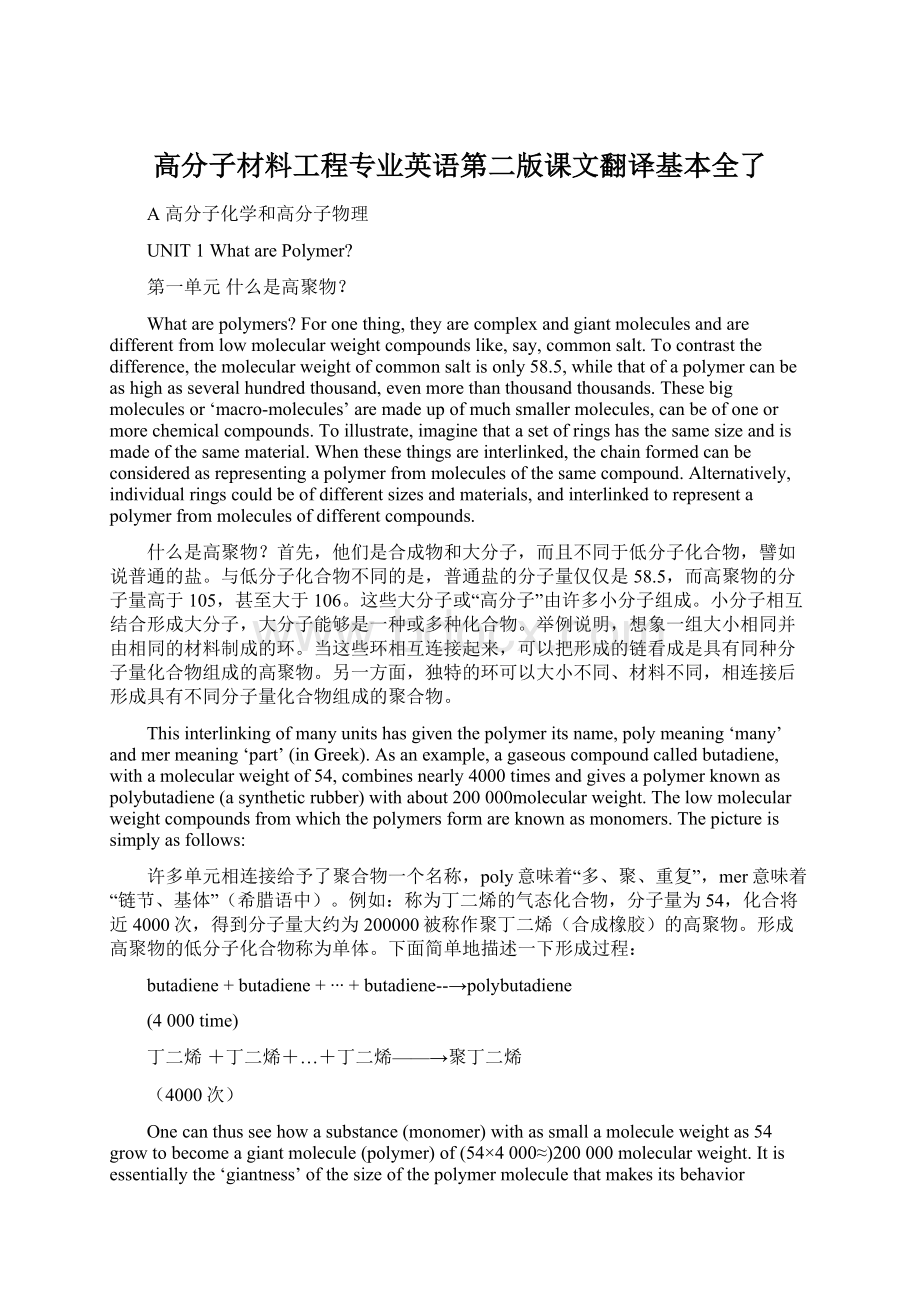高分子材料工程专业英语第二版课文翻译基本全了Word格式.docx
《高分子材料工程专业英语第二版课文翻译基本全了Word格式.docx》由会员分享,可在线阅读,更多相关《高分子材料工程专业英语第二版课文翻译基本全了Word格式.docx(30页珍藏版)》请在冰豆网上搜索。

这些大分子或“高分子”由许多小分子组成。
小分子相互结合形成大分子,大分子能够是一种或多种化合物。
举例说明,想象一组大小相同并由相同的材料制成的环。
当这些环相互连接起来,可以把形成的链看成是具有同种分子量化合物组成的高聚物。
另一方面,独特的环可以大小不同、材料不同,相连接后形成具有不同分子量化合物组成的聚合物。
Thisinterlinkingofmanyunitshasgiventhepolymeritsname,polymeaning‘many’andmermeaning‘part’(inGreek).Asanexample,agaseouscompoundcalledbutadiene,withamolecularweightof54,combinesnearly4000timesandgivesapolymerknownaspolybutadiene(asyntheticrubber)withabout200000molecularweight.Thelowmolecularweightcompoundsfromwhichthepolymersformareknownasmonomers.Thepictureissimplyasfollows:
许多单元相连接给予了聚合物一个名称,poly意味着“多、聚、重复”,mer意味着“链节、基体”(希腊语中)。
例如:
称为丁二烯的气态化合物,分子量为54,化合将近4000次,得到分子量大约为200000被称作聚丁二烯(合成橡胶)的高聚物。
形成高聚物的低分子化合物称为单体。
下面简单地描述一下形成过程:
butadiene+butadiene+∙∙∙+butadiene--→polybutadiene
(4000time)
丁二烯+丁二烯+…+丁二烯——→聚丁二烯
(4000次)
Onecanthusseehowasubstance(monomer)withassmallamoleculeweightas54growtobecomeagiantmolecule(polymer)of(54×
4000≈)200000molecularweight.Itisessentiallythe‘giantness’ofthesizeofthepolymermoleculethatmakesitsbehaviordifferentfromthatofacommonlyknownchemicalcompoundsuchasbenzene.Solidbenzene,forinstance,meltstobecomeliquidbenzeneat5.5℃and,onfurtherheating,boilsintogaseousbenzene.Asagainstthiswell-definedbehaviorofasimplechemicalcompound,apolymerlikepolyethylenedoesnotmeltsharplyatoneparticulartemperatureintocleanliquid.Instead,itbecomesincreasinglysofterand,ultimately,turnsintoaveryviscous,tackymoltenmass.Furtherheatingofthishot,viscous,moltenpolymerdoesconvertitintovariousgasesbutitisnolongerpolyethylene.(Fig.1.1).
因而能够看到分子量仅为54的小分子物质(单体)如何逐渐形成分子量为200000的大分子(高聚物)。
实质上,正是由于聚合物的巨大的分子尺寸才使其性能不同于象苯这样的一般化合物。
例如,固态苯,在5.5℃熔融成液态苯,进一步加热,煮沸成气态苯。
与这类简单化合物明确的行为相比,像聚乙烯这样的聚合物不能在某一特定的温度快速地熔融成纯净的液体。
而聚合物变得越来越软,最终,变成十分粘稠的聚合物熔融体。
将这种热而粘稠的聚合物熔融体进一步加热,不会转变成各种气体,但它不再是聚乙烯(如图1.1)。
固态苯——→液态苯——→气态苯
加热,5.5℃加热,80℃
固体聚乙烯——→熔化的聚乙烯——→各种分解产物-但不是聚乙烯
加热加热
图1.1低分子量化合物(苯)和聚合物(聚乙烯)受热后的不同行为
Anotherstrikingdifferencewithrespecttothebehaviorofapolymerandthatofalowmolecularweightcompoundconcernsthedissolutionprocess.Letustake,forexample,sodiumchlorideandadditslowlytosfixedquantityofwater.Thesalt,whichrepresentsalowmolecularweightcompound,dissolvesinwateruptospoint(calledsaturationpoint)but,thereafter,anyfurtherquantityaddeddoesnotgointosolutionbutsettlesatthebottomandjustremainsthereassolid.Theviscosityofthesaturatedsaltsolutionisnotverymuchdifferentfromthatofwater.Butifwetakeapolymerinstead,say,polyvinylalcohol,andaddittoafixedquantityofwater,thepolymerdoesnotgointosolutionimmediately.Theglobulesofpolyvinylalcoholfirstabsorbwater,swellandgetdistortedinshapeandafteralongtimegointosolution.Also,wecanaddaverylargequantityofthepolymertothesamequantityofwaterwithoutthesaturationpointeverbeingreached.Asmoreandmorequantityofpolymerisaddedtowater,thetimetakenforthedissolutionofthepolymerobviouslyincreasesandthemixultimatelyassumesasoft,dough-likeconsistency.Anotherpeculiarityisthat,inwater,polyvinylalcoholneverretainsitsoriginalpowderynatureastheexcesssodiumchloridedoesinasaturatedsaltsolution.Inconclusion,wecansaythat
(1)thelongtimetakenbypolyvinylalcoholfordissolution,
(2)theabsenceofasaturationpoint,and(3)theincreaseintheviscosityareallcharacteristicsofatypicalpolymerbeingdissolvedinasolventandthesecharacteristicsareattributedmainlytothelargemolecularsizeofthepolymer.ThebehaviorofalowmolecularweightcompoundandthatofapolymerondissolutionareillustratedinFig.1.2.
发现另一种不同的聚合物行为和低分子量化合物行为是关于溶解过程。
例如,让我们研究一下,将氯化钠慢慢地添加到固定量的水中。
盐,代表一种低分子量化合物,在水中达到点(叫饱和点)溶解,但,此后,进一步添加盐不进入溶液中却沉到底部而保持原有的固体状态。
饱和盐溶液的粘度与水的粘度不是十分不同,但是,如果我们用聚合物替代,譬如说,将聚乙烯醇添加到固定量的水中,聚合物不是马上进入到溶液中。
聚乙烯醇颗粒首先吸水溶胀,发生形变,经过很长的时间以后进入到溶液中。
同样地,我们可以将大量的聚合物加入到同样量的水中,不存在饱和点。
将越来越多的聚合物加入水中,认为聚合物溶解的时间明显地增加,最终呈现柔软像面团一样粘稠的混合物。
另一个特点是,在水中聚乙烯醇不会像过量的氯化钠在饱和盐溶液中那样能保持其初始的粉末状态。
总之,我们可以讲
(1)聚乙烯醇的溶解需要很长时间,
(2)不存在饱和点,(3)粘度的增加是典型聚合物溶于溶液中的特性,这些特性主要归因于聚合物大分子的尺寸。
如图1.2说明了低分子量化合物和聚合物的溶解行为。
氯化钠晶体加入到水中——→晶体进入到溶液中.溶液的粘度不是十分不同于
充分搅拌
水的粘度——→形成饱和溶液.剩余的晶体维持不溶解状态.
加入更多的晶体并搅拌
氯化钠的溶解
聚乙烯醇碎片加入到水中——→碎片开始溶胀——→碎片慢慢地进入到溶液中
允许维持现状充分搅拌
——→形成粘稠的聚合物溶液.溶液粘度十分高于水的粘度
继续搅拌
聚合物的溶解
图1.2低分子量化合物(氯化钠)和聚合物(聚乙烯醇)不同的溶解行为
——GowarikerVR,ViswanathanNV,SreedharJ.PolymerScience.NewYork:
JohnWiley&
Sons,1986.6
UNIT2ChainPolymerization
第二单元链式聚合反应
Manyolefinicandvinylunsaturatedcompoundsareabletoformchain-0likemacromoleculesthrougheliminationofthedoublebond,aphenomenonfirstrecognizedbyStaudinger.Diolefinspolymerizeinthesamemanner,however,onlyoneofthetwodoublebondsiseliminated.Suchreactionsoccurthroughtheinitialadditionofamonomermoleculetoaninitiatorradicaloraninitiatorion,bywhichtheactivestateistransferredfromtheinitiatortotheaddedmonomer.Inthesamewaybymeansofachainreaction,onemonomermoleculeaftertheotherisadded(2000~20000monomerspersecond)untiltheactivestateisterminatedthroughadifferenttypeofreaction.Thepolymerizationisachainreactionintwoways:
becauseofthereactionkineticandbecauseasareactionproductoneobtainsachainmolecule.Thelengthofthechainmoleculeisproportionaltothekineticchainlength.
Staudinger第一个发现一例现象,许多烯烃和不饱和烯烃通过打开双键可以形成链式大分子。
二烯烃以同样的方式聚合,然而,仅限于两个双键中的一个。
这类反应是通过单体分子首先加成到引发剂自由基或引发剂离子上而进行的,靠这些反应活性中心由引发剂转移到被加成的单体上。
以同样的方式,借助于链式反应,单体分子一个接一个地被加成(每秒2000~20000个单体)直到活性中心通过不同的反应类型而终止。
聚合反应是链式反应的原因有两种:
因为反应动力学和因为作为反应产物它是一种链式分子。
链分子的长度与动力学链长成正比。
Onecansummarizetheprocessasfollow(R.isequaltotheinitiatorradical):
链式反应可以概括为以下过程(R·
相当与引发剂自由基):
略
Onethusobtainspolyvinylchloridefromvinylchloride,orpolystyrenefromstyrene,orpolyethylenefromethylene,etc.
因而通过上述过程由氯乙烯得到聚氯乙烯,或由苯乙烯获得聚苯乙烯,或乙烯获得聚乙烯,等等。
Thelengthofthechainmolecules,measuredbymeansofthedegreeofpolymerization,canbevariedoveralargerangethroughselectionofsuitablereactionconditions.Usually,withcommerciallypreparedandutilizedpolymers,thedegreeofpolymerizationliesintherangeof1000to5000,butinmanycasesitcanbebelow500andover10000.Thisshouldnotbeinterpretedtomeanthatallmoleculesofacertainpolymericmaterialconsistof500,or1000,or5000monomerunits.Inalmostallcases,thepolymericmaterialconsistsofamixtureofpolymermoleculesofdifferentdegreesofpolymerization.
借助于聚合度估算的分子链长,在一个大范围内可以通过选择适宜的反应条件被改变。
通常,通过大量地制备和利用聚合物,聚合度在1000~5000范围内,但在许多情况下可低于500、高于10000。
这不应该把所有聚合物材料的分子量理解为由500,或1000,或5000个单体单元组成。
在几乎所有的事例中,聚合物材料由不同聚合度的聚合物分子的混合物组成。
Polymerization,achainreaction,occursaccordingtothesamemechanismasthewell-knownchlorine-hydrogenreactionandthedecompositionofphosegene.
聚合反应,链式反应,依照与众所周知的氯(气)-氢(气)反应和光气的分解机理进行。
Theinitiationreaction,whichistheactivationprocessofthedoublebond,canbebroughtaboutbyheating,irradiation,ultrasonics,orinitiators.Theinitiationofthechainreactioncanbeobservedmostclearlywithradicalorionicinitiators.Theseareenergy-richcompoundswhichcanaddsuitableunsaturatedcompounds(monomers)andmaintaintheactivatedradical,orionic,statesothatfurthermonomermoleculescanbeaddedinthesamemanner.Fortheindividualstepsofthegrowthreactiononeneedsonlyarelativelysmallactivationenergyandthereforethroughasingleactivationstep(theactualinitiationreaction)alargenumberofolefinmoleculesareconverted,asisimpliedbytheterm“chainreaction”.Becauseverysmallamountsoftheinitiatorbringabouttheformationofalargeamountofpolymericmaterial(1:
1000to1:
1000),itispossibletoregardpolymerizationfromasuperficialpointofviewasacatalyticreaction.Forthisreason,theinitiatorsusedinpolymerizationreactionsareoftendesignatedaspolymerizationcatalysts,eventhough,inthestrictestsense,theyarenottruecatalystsbecausethepolymerizationinitiatorentersintothereactionasarealpartnerandcanbefoundchemicallyboundinthereactionproduct,i.e.,thepolymer,Inadditiontotheionicandradicalinitiatorstherearenowmetalcomplexinitiators(whichcanbeobtained,forexample,bythereactionoftitaniumtetrachlorideortitaniumtrichloridewithaluminumalkyls),whichplayanimportantroleinpolymerizationreactions(Zieglercatalysts),Themechanismoftheircatalyticactionisnotyetcompletelyclear.
双键活化过程的引发剂反应,可以通过热、辐射、超声波或引发剂产生。
用自由基型或离子型引发剂引发链式反应可以很清楚地进行观察。
这些是高能态的化合物,它们能够加成不饱和化合物(单体)并保持自由基或离子活性中心以致单体可以以同样的方式进一步加成。
对于增长反应的各个步骤,每一步仅需要相当少的活化能,因此通过一步简单的活化反应(即引发反应)即可将许多烯类单体分子转化成聚合物,这正如连锁反应这个术语的内涵那样。
因为少量的引发剂引发形成大量的聚合物原料(1:
1000~1:
10000),从表面上看聚合反应很可能是催